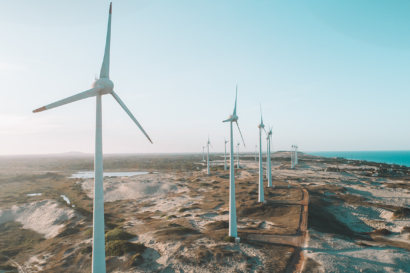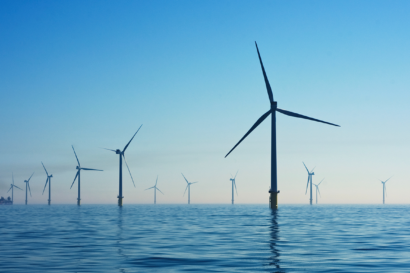PRESS RELEASES | 05/03/2024
New collaboration on how the planning system can better deliver net zero

Please click here to read the interim findings of this project, published in July 2024.
Delivering a net zero energy system requires bold collaboration across a range of sectors and disciplines. A new initiative between the Aldersgate Group, Renewable UK, and CPRE, the countryside charity aims to deliver this, by examining how the planning system needs to change to achieve net zero. Together, this collaboration will investigate how the policy landscape can enable the decarbonisation of our energy system whilst protecting landscapes, nature and communities’ right to input.
Our climate is changing and we need to act quickly to protect our economy, wellbeing, and natural environment. This includes decarbonising our energy system so that we can heat our homes and power industry with significantly reduced impact on the climate. To generate and transport green electricity we need new infrastructure, not just wind turbines and solar panels but also the cables and substations to bring electricity to our homes and businesses.
Our planning system needs to be improved if progress towards net zero is to be sped up. To meet the targets to decarbonise the electricity system set by political parties – 2035 by the Conservatives, 2030 by Labour – and meet growing demand for electricity, new infrastructure must be built rapidly. National Grid ESO projections suggest the UK needs to build over five times as many new high-voltage transmission lines by 2030 as have been delivered over the last 30 years. [1]
The system needs to change if clean energy targets are to be met, economic growth and productivity unlocked and negative climate impacts avoided. That is why this collaborative project was formed, bringing together a range of organisations to reach a consensus on a set of shared principles for a new system that enables rapid decarbonisation. We recognise that transformational change needs transformational thinking. The UK needs a planning system that facilitates net zero and protects the environment, while allowing space for civil society and communities to have influence.
The project is now underway and will deliver interim findings and in spring, followed by final recommendations in the autumn.
The Aldersgate Group’s Executive Director, Rachel Solomon Williams, said: “I am excited about this project because it will bring together a broad cross-section of business and society to consider a live national conundrum: how the planning system can support the decarbonisation of the grid while also protecting our valuable natural environment. A planning system that functions smoothly and predictably would be transformative for the economy, the environment and communities. This project aims to offer practical next steps which could help to move the system in that direction, as part of the wider ongoing debate on how we make decisions about our land use.”
CPRE’s CEO, Roger Mortlock, said: “Climate change is the biggest threat our countryside faces. To protect its future for us all, we want to make sure that our transition to a net zero energy system is done in the best way, with new infrastructure in the right places. That means protecting the landscapes we all value, helping to restore nature, and shoring up meaningful community and civil society influence. We’re committed to collaborating to find solutions so we’re looking forward to working on this initiative with Aldersgate Group and Renewable UK.”
RenewableUK’s Head of Policy, James Robottom, said: “If we are to build the renewable energy we need to reach net-zero and achieve better economic growth and productivity, we desperately need a planning system that is well-resourced, timely and proportionate. We need major upgrades to grid infrastructure which have to be delivered at pace to capitalise on the economic and environmental opportunity the transition provides. We need a planning system that encourages good quality applications which make the best, most efficient use of the available resources and land, whilst engaging closely with communities and stakeholders, ensuring that they continue to have meaningful input into decisions throughout the process.”
[1] National Grid (2023) Delivering for 2035


